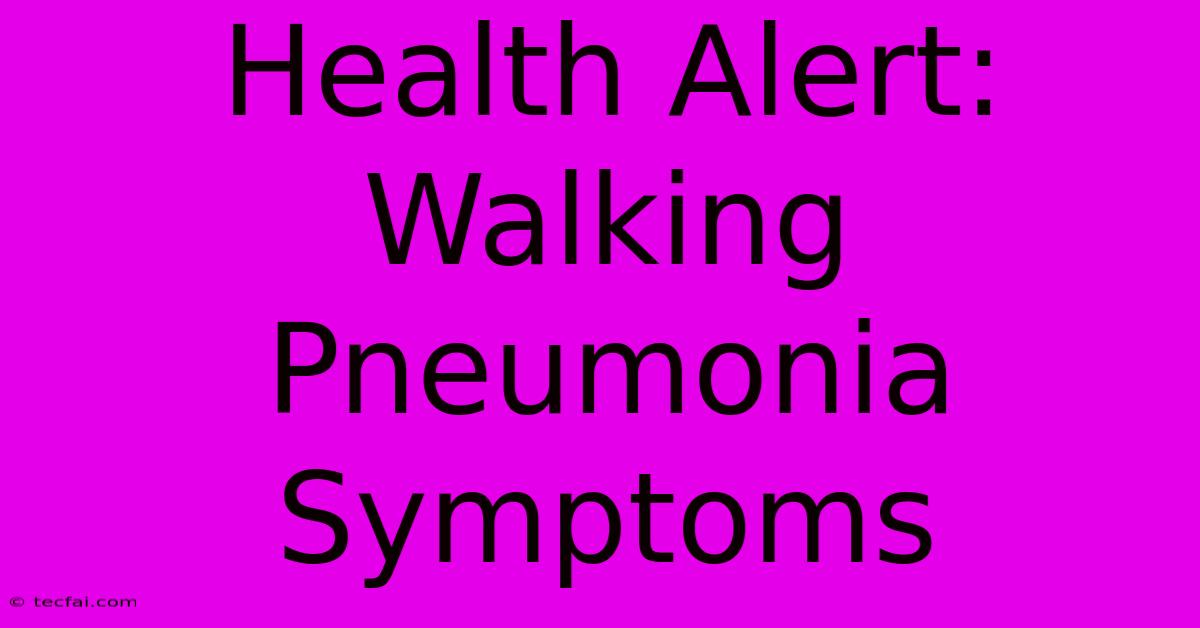Health Alert: Walking Pneumonia Symptoms

Discover more detailed and exciting information on our website. Click the link below to start your adventure: Visit Best Website tecfai.com. Don't miss out!
Table of Contents
Health Alert: Walking Pneumonia Symptoms
Walking pneumonia, also known as atypical pneumonia, is a milder form of pneumonia caused by bacteria, most commonly Mycoplasma pneumoniae. Unlike typical pneumonia, which often requires hospitalization, walking pneumonia typically presents with less severe symptoms, allowing individuals to remain active – hence the name. However, this doesn't mean it's something to ignore. Understanding its symptoms is crucial for early diagnosis and treatment.
Recognizing the Subtle Signs: Common Symptoms of Walking Pneumonia
While walking pneumonia is generally less severe than other types of pneumonia, it still warrants attention. The symptoms can be subtle and easily mistaken for a common cold or flu. Be vigilant and seek medical attention if you experience any of the following:
Respiratory Symptoms:
- Persistent cough: This is often a hallmark symptom, typically dry at first but may eventually produce mucus. The cough can be quite bothersome and last for several weeks.
- Mild fever: Unlike typical pneumonia, a high fever isn't always present. You might experience only a low-grade fever or no fever at all.
- Fatigue and weakness: Feeling unusually tired and lacking energy is common, even with minimal physical activity.
- Shortness of breath: While not as severe as in typical pneumonia, some individuals experience shortness of breath, especially during exertion.
- Chest discomfort: A mild ache or tightness in the chest might be present.
Other Symptoms:
- Headache: Persistent headaches are a possible symptom of walking pneumonia.
- Body aches: Muscle aches and joint pain can accompany other respiratory symptoms.
- Sore throat: A mild to moderate sore throat might also be experienced.
- Loss of appetite: Reduced appetite and weight loss are not uncommon.
- Skin rash: In some cases, a skin rash may develop.
When to See a Doctor: Don't Underestimate Walking Pneumonia
While the symptoms of walking pneumonia might seem mild compared to other respiratory illnesses, it's crucial to seek medical attention if you suspect you might have it. Delaying treatment can lead to complications. Consult a doctor immediately if you experience:
- Worsening symptoms: Any progressive worsening of symptoms, such as increased shortness of breath or a persistent high fever, requires prompt medical attention.
- Symptoms lasting longer than two weeks: A cough and other symptoms persisting beyond two weeks warrant a doctor's evaluation.
- Difficulty breathing: If you're experiencing significant difficulty breathing, seek immediate medical care.
Diagnosis and Treatment of Walking Pneumonia
Your doctor will likely perform a physical exam and may order tests to confirm the diagnosis. These tests can include:
- Chest X-ray: This can help rule out other conditions and assess the severity of lung involvement. Note: Chest X-rays may appear normal even with walking pneumonia.
- Blood tests: Blood tests can help identify the presence of antibodies to Mycoplasma pneumoniae.
Treatment for walking pneumonia typically involves antibiotics, although the course of treatment is usually shorter than for other types of pneumonia. Your doctor will prescribe the appropriate antibiotic based on your specific condition. Rest, plenty of fluids, and over-the-counter pain relievers can also help manage symptoms.
Preventing the Spread of Walking Pneumonia
Walking pneumonia is contagious, typically spreading through respiratory droplets produced when an infected person coughs or sneezes. Practicing good hygiene can significantly reduce your risk of infection:
- Frequent handwashing: Wash your hands frequently with soap and water, especially after coughing, sneezing, or touching surfaces in public areas.
- Avoid close contact: Avoid close contact with individuals who are sick.
- Cover coughs and sneezes: Cover your mouth and nose with a tissue or your elbow when you cough or sneeze.
- Practice good respiratory hygiene: Proper respiratory etiquette is crucial to minimize the spread of infection.
This information is for general knowledge and informational purposes only, and does not constitute medical advice. Always consult with a qualified healthcare professional for any health concerns or before making any decisions related to your health or treatment. Self-treating can be dangerous, and professional medical advice is always recommended.

Thank you for visiting our website wich cover about Health Alert: Walking Pneumonia Symptoms. We hope the information provided has been useful to you. Feel free to contact us if you have any questions or need further assistance. See you next time and dont miss to bookmark.
Featured Posts
-
Tjx Companies Stock Buy Great Valley Advisor Group
Nov 26, 2024
-
Premier League Newcastle United West Ham
Nov 26, 2024
-
Chill Guy Meme Coin Tumalon Ng 50
Nov 26, 2024
-
World Chess Ding Beats Gukesh
Nov 26, 2024
-
Al Nassr Wins Gha 1 3 Nas Highlights
Nov 26, 2024
